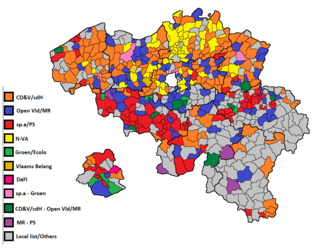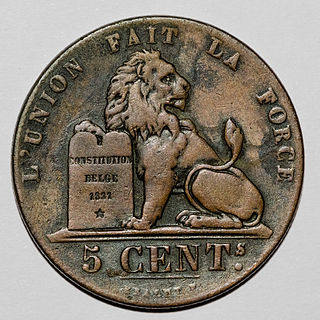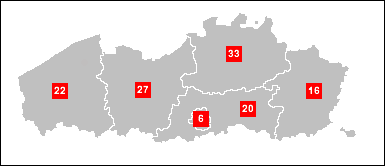
Belgium is a federal state with a multi-party political system, with numerous parties who factually have no chance of gaining power alone, and therefore must work with each other to form coalition governments.
On 13 June 2004, regional elections were held in Belgium, to choose representatives in the regional councils of the Flemish Parliament, the Walloon Parliament, the Brussels Parliament and the German-speaking Community of Belgium. The elections were held on the same day as the European elections.

The Parliament of the Walloon Region, which brands itself as the Parliament of Wallonia and previously as the Walloon Parliament, is the legislative body of the Walloon Region (Wallonia), one of the three self-governing regions of Belgium. The parliament building, the former Hospice Saint-Gilles, is situated in Namur, the capital of Wallonia, at the symbolic confluence of the Meuse and the Sambre, the two main rivers of the most inhabited parts of Wallonia, the Sillon industriel. On the other side of the Meuse, facing the Parliament, is the Élysette, the seat of the Walloon government.

The Parliament of the Brussels-Capital Region, is the governing body of the Brussels-Capital Region, one of the three regions of Belgium. It is also known as the Brussels Regional Parliament.

Elections in Belgium are organised for legislative bodies only, and not for executive functions. Direct elections take place for the European Parliament, the bicameral Federal Parliament, the Parliaments of the Communities and Regions, the provincial councils, the municipal councils and a few district councils. Voting is mandatory and all elections use proportional representation which in general requires coalition governments.

The 2007 Belgian federal election took place on Sunday 10 June 2007. Voters went to the polls in order to elect new members for the Chamber of Representatives and Senate.
The 2007–2008 Belgian government formation followed the general election of 10 June 2007, and comprised a period of negotiation in which the Flemish parties Flemish Liberal Democratic, Christian Democratic and Flemish (CD&V) and New Flemish Alliance (N-VA), and the French-speaking parties Reformist Movement (MR), Democratic Front of Francophones (FDF) and Humanist Democratic Centre (CdH) negotiated to form a government coalition. The negotiations were characterized by the disagreement between the Dutch- and French-speaking parties about the need for and nature of a constitutional reform. According to some, this political conflict could have led to a partition of Belgium.
Regional elections were held in Belgium on 7 June 2009 to choose representatives in the regional parliaments of Flanders, Wallonia, Brussels and the German-speaking Community of Belgium. These elections were held on the same day as the European elections.

The government of the Brussels-Capital Region is the political administration of the Brussels region of Belgium. An election is held every five years. The government is headed by a Minister-President, four ministers and three state secretaries.

The Pirate Party of Belgium is a political party in Belgium. Based on the model of the Swedish Pirate Party, it supports reform of copyright law, the abolition of patents, and respect for privacy. It was a founding member of Pirate Parties International.
Following the Belgian general election held on 13 June 2010, a process of cabinet formation started in Belgium. The election produced a very fragmented political landscape, with 11 parties elected to the Chamber of Representatives, none of which won more than 20% of the seats. The Flemish-Nationalist New Flemish Alliance (N-VA), the largest party in Flanders and the country as a whole, controlled 27 of 150 seats in the lower chamber. The Francophone Socialist Party (PS), the largest in Wallonia, controlled 26 seats. Cabinet negotiations continued for a long time. On 1 June 2011, Belgium matched the record for time taken to form a new democratic government after an election, at 353 days, held until then by Cambodia in 2003–2004. On 11 October 2011, the final agreement for institutional reform was presented to the media. A government coalition was named on 5 December 2011 and sworn in after a total of 541 days of negotiations and formation on 6 December 2011, and 589 days without an elected government with Elio Di Rupo named Prime Minister of the Di Rupo I Government.

The Belgian provincial, municipal and district elections of 2012 took place on 14 October. As with the previous 2006 elections, these are no longer organised by the Belgian federal state but instead by the respective regions:

The Di Rupo Government was the federal cabinet of Belgium sworn in on 6 December 2011, after a record-breaking 541 days of negotiations following the June 2010 elections. The government included social democrats (sp.a/PS), Christian democrats (CD&V/cdH) and liberals, respectively of the Dutch and French language groups. The government notably excluded the New Flemish Alliance (N-VA), the Flemish nationalist party which achieved a plurality and became the largest party. Its absence, together with the unwillingness of Open Vld to enter into an eight-party coalition that included the green parties, caused the government coalition to lack a majority in the Dutch language group. It was the first time that the Belgian prime minister had been openly gay, as Di Rupo became the world's first male openly gay head of government. Elio Di Rupo became the first native French-speaking prime minister since 1979 and the first prime minister from Wallonia since 1974 and first socialist prime minister since 1974.

Federal elections were held in Belgium on 25 May 2014. All 150 members of the Chamber of Representatives were elected, whereas the Senate was no longer directly elected following the 2011–2012 state reform. These were the first elections held under King Philippe's reign.
Regional elections were held in Belgium on 25 May 2014 to choose representatives for the Flemish Parliament, Walloon Parliament, Brussels Parliament and the Parliament of the German-speaking Community. These elections were held on the same day as the 2014 European elections as well as the 2014 Belgian federal election.
Following the simultaneous federal elections and regional elections of 25 May 2014, negotiations started to form a new Federal Government as well as new regional governments: a Flemish, Walloon, French Community and Brussels Government. A Government of the German-speaking Community was formed only a few days after the elections.

The Michel I Government was the Federal Government of Belgium formed following the 2014 Belgian government formation and sworn in on 11 October 2014. The administration is a centre-right coalition of the New Flemish Alliance (N-VA), the Christian Democratic and Flemish (CD&V), the Open Flemish Liberals and Democrats and the Reformist Movement (MR). The prime minister is Charles Michel. The government had an agenda of socio-economic reforms, especially through austerity measures, with its priorities being improving Belgium's economic competitiveness and reducing unemployment. It fell in December 2018 over the Global Compact for Migration.

The 2019 Belgian federal election will take place on the same day as the 2019 European Parliament elections and the 2019 Belgian regional elections, being 26 May 2019, unless snap elections are called.

The Belgian provincial, municipal and district elections of 2018 took place on Sunday 14 October 2018. They are organised by the respective regions:
















